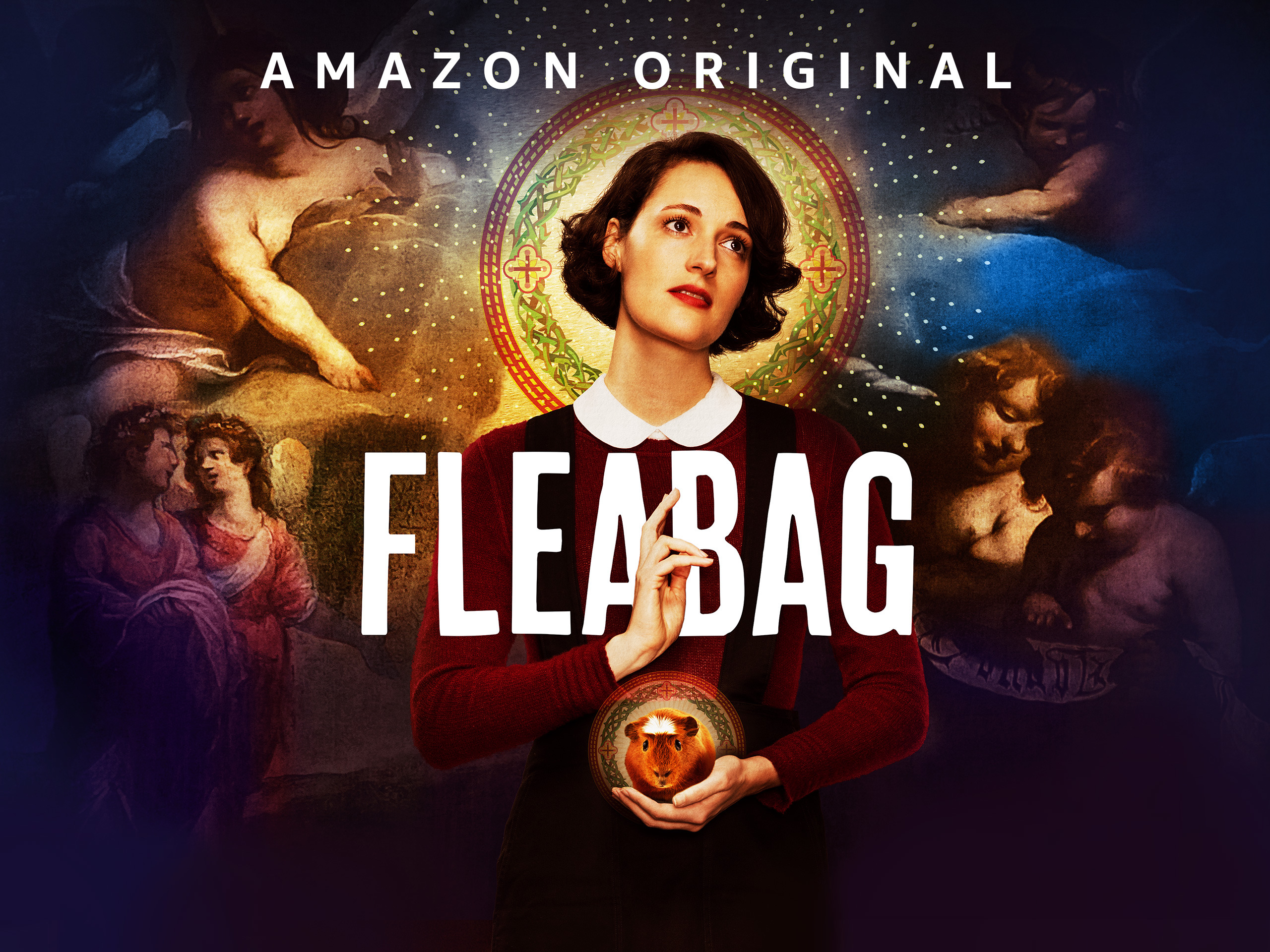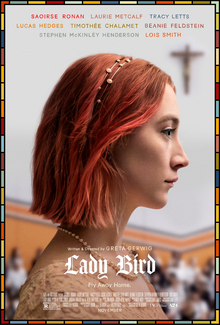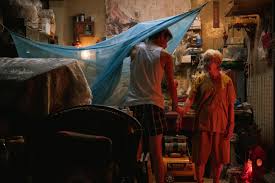

“Love is awful. It’s awful. It’s painful. It’s frightening. It makes you doubt yourself, judge yourself, distance yourself from the other people in your life. It makes you selfish. It makes you creepy, makes you obsessed with your hair, makes you cruel, makes you say and do things you never thought you would do. It’s all any of us want, and it’s hell when we get there. So no wonder it’s something we don’t want to do on our own. I was taught if we’re born with love then life is about choosing the right place to put it. People talk about that a lot, feeling right, when it feels right it’s easy. But I’m not sure that’s true. It takes strength to know what’s right. And love isn’t something that weak people do. Being a romantic takes a hell of a lot of hope. I think what they mean is, when you find somebody that you love, it feels like hope.”
The series Fleabag follows a young woman (Phoebe Waller-Bridge), and her struggle in all areas of her life, especially deeply exploring her relationships. Fleabag is full of ridiculous yet realistic moments, with great comedic timing and dry British humour, that is truly entertaining and honestly endlessly rewatchable. Because it clearly tackles different types of love, and doesn’t directly address our main character (whom we can only guess is called Fleabag), everyone is able to find an aspect to identify with.
A theatre technique used that makes Fleabag stand out from other dramedies is breaking the fourth wall, applied in this series because it was originally a one-woman theatre production. This technique allows us to follow Fleabag’s thoughts in real time, as conversations are happening, and adds comedic relief to the story. Sometimes all Fleabag has to do is glance in the camera over her shoulder all-knowingly like Jim in The Office, other times she just mutters a word under her breath, but all the same, this keeps the audience on the edge of their seats.
A theme Fleabag addresses is how everyone needs a partner: all the characters seem to need someone for emotional support and connection. When looking at their father’s relationship with his new wife, it seems the affection is much stronger from her side. For their father, his new partner gives him much-needed comfort after his wife’s passing. As viewers, we hear more from the Stepmother how much she likes the father but not vice versa, so he’s more passive. Therefore, to me it seems that he just needs the comfort of someone’s constant presence that he knows well. It is particularly important for this point that the audience can feel that the mother is gone from the characters’ lives as we do not see her on screen even through flashbacks. Instead, we only see her grave, or a sculpture of her, and know of her through conversations. This adds the sense that her death is somewhat haunting them. As for Fleabag, many of her relationships also feel somewhat problematic, as we see her engage in meaningless sex, without acknowledging the other person’s wish for an emotional connection. This is evident in the first relationship we as viewers are presented with, where the partner strives for more connection, while Fleabag gives up easily and moves on to someone else. Notably, the main conflict with her best friend is from this behaviour too.
The opening quote is said by “the Priest ” introduced in the second season, who ironically becomes Fleabag’s serious love interest. I think the fate of this relationship is evident from the start, as the Priest devoted himself to the church, so will not engage in a relationship with anyone. His celibacy clearly contrasts with Fleabag’s approach to her relationships. Perhaps it is specifically this difference and obstacle that motivates Fleabag to change and grow in this area, we see her desire to be better for someone else. For example, it is clear that Fleabag’s thoughts and feelings are genuine, waiting to be reciprocated on the same level. Furthermore, we see Fleabag calmer and with clearer intentions in her romantic relationship. In a poignant and bittersweet ending to the series, this weight and complexity of their relationship and her change left me wondering about how we all leave long-lasting impressions on each other.
Overall, I think there’s more to the show than what you get at first glance. You might have already heard the phrase “Fleabag-era online”, referring to and condoning a messy and careless lifestyle. Although it might be easy to think of the show like this, for me it had the opposite effect: it felt like a self-aware show. By displaying all the details and thoughts of Fleabag’s life so explicitly, it brought us to see the flaws in it. In addition, we can see that the main character does not truly want to live like this, but only uses it as a coping mechanism. Fleabag encapsulates many aspects that we might see in ourselves or others we know. I believe that this show really embodies how complicated humans and relationships are, and that no issues are purely black and white or have to remain as such.
Directed by: Harry Bradbeer
Written by: Phoebe Waller-Bridge
Fleabag is available on Amazon Prime.

“Love is awful. It’s awful. It’s painful. It’s frightening. It makes you doubt yourself, judge yourself, distance yourself from the other people in your life. It makes you selfish. It makes you creepy, makes you obsessed with your hair, makes you cruel, makes you say and do things you never thought you would do. It’s all any of us want, and it’s hell when we get there. So no wonder it’s something we don’t want to do on our own. I was taught if we’re born with love then life is about choosing the right place to put it. People talk about that a lot, feeling right, when it feels right it’s easy. But I’m not sure that’s true. It takes strength to know what’s right. And love isn’t something that weak people do. Being a romantic takes a hell of a lot of hope. I think what they mean is, when you find somebody that you love, it feels like hope.”
The series Fleabag follows a young woman (Phoebe Waller-Bridge), and her struggle in all areas of her life, especially deeply exploring her relationships. Fleabag is full of ridiculous yet realistic moments, with great comedic timing and dry British humour, that is truly entertaining and honestly endlessly rewatchable. Because it clearly tackles different types of love, and doesn’t directly address our main character (whom we can only guess is called Fleabag), everyone is able to find an aspect to identify with.
A theatre technique used that makes Fleabag stand out from other dramedies is breaking the fourth wall, applied in this series because it was originally a one-woman theatre production. This technique allows us to follow Fleabag’s thoughts in real time, as conversations are happening, and adds comedic relief to the story. Sometimes all Fleabag has to do is glance in the camera over her shoulder all-knowingly like Jim in The Office, other times she just mutters a word under her breath, but all the same, this keeps the audience on the edge of their seats.
A theme Fleabag addresses is how everyone needs a partner: all the characters seem to need someone for emotional support and connection. When looking at their father’s relationship with his new wife, it seems the affection is much stronger from her side. For their father, his new partner gives him much-needed comfort after his wife’s passing. As viewers, we hear more from the Stepmother how much she likes the father but not vice versa, so he’s more passive. Therefore, to me it seems that he just needs the comfort of someone’s constant presence that he knows well. It is particularly important for this point that the audience can feel that the mother is gone from the characters’ lives as we do not see her on screen even through flashbacks. Instead, we only see her grave, or a sculpture of her, and know of her through conversations. This adds the sense that her death is somewhat haunting them. As for Fleabag, many of her relationships also feel somewhat problematic, as we see her engage in meaningless sex, without acknowledging the other person’s wish for an emotional connection. This is evident in the first relationship we as viewers are presented with, where the partner strives for more connection, while Fleabag gives up easily and moves on to someone else. Notably, the main conflict with her best friend is from this behaviour too.
The opening quote is said by “the Priest ” introduced in the second season, who ironically becomes Fleabag’s serious love interest. I think the fate of this relationship is evident from the start, as the Priest devoted himself to the church, so will not engage in a relationship with anyone. His celibacy clearly contrasts with Fleabag’s approach to her relationships. Perhaps it is specifically this difference and obstacle that motivates Fleabag to change and grow in this area, we see her desire to be better for someone else. For example, it is clear that Fleabag’s thoughts and feelings are genuine, waiting to be reciprocated on the same level. Furthermore, we see Fleabag calmer and with clearer intentions in her romantic relationship. In a poignant and bittersweet ending to the series, this weight and complexity of their relationship and her change left me wondering about how we all leave long-lasting impressions on each other.
Overall, I think there’s more to the show than what you get at first glance. You might have already heard the phrase “Fleabag-era online”, referring to and condoning a messy and careless lifestyle. Although it might be easy to think of the show like this, for me it had the opposite effect: it felt like a self-aware show. By displaying all the details and thoughts of Fleabag’s life so explicitly, it brought us to see the flaws in it. In addition, we can see that the main character does not truly want to live like this, but only uses it as a coping mechanism. Fleabag encapsulates many aspects that we might see in ourselves or others we know. I believe that this show really embodies how complicated humans and relationships are, and that no issues are purely black and white or have to remain as such.
Directed by: Harry Bradbeer
Written by: Phoebe Waller-Bridge
Fleabag is available on Amazon Prime.
Directed by: Harry Bradbeer
Written by: Phoebe Waller-Bridge
Fleabag is available on Amazon Prime.



